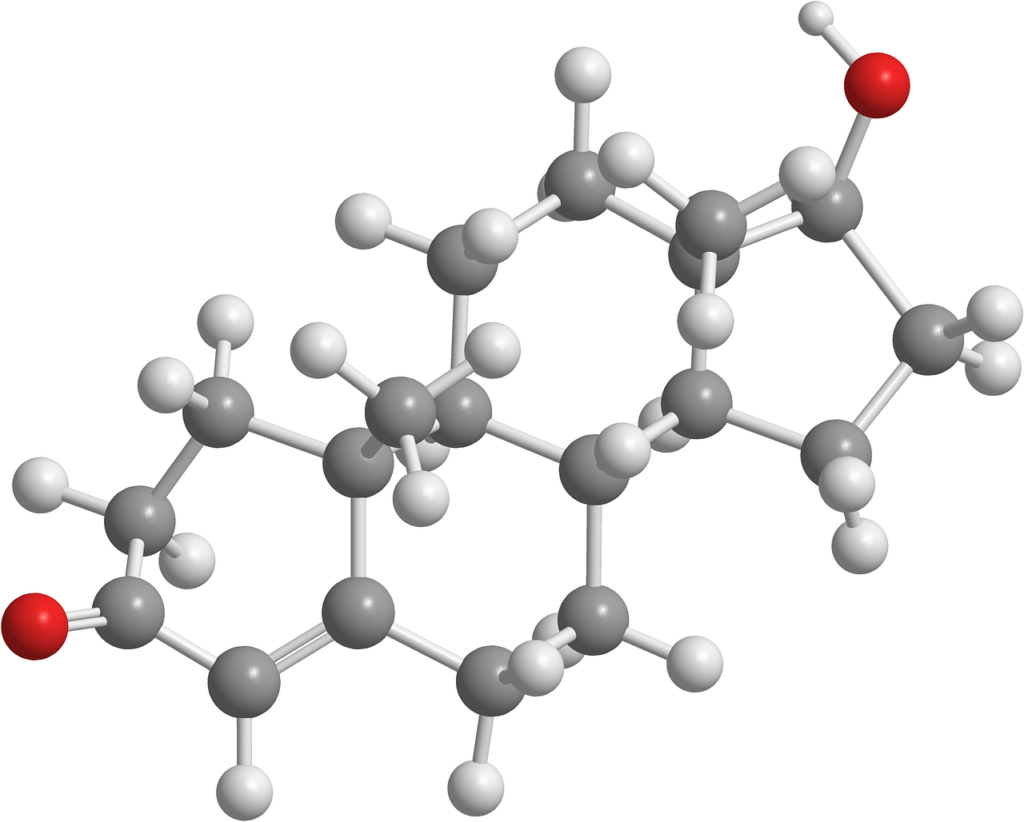Testosterone is a hormone that is primarily produced in the testes in males and in smaller amounts in the ovaries in females. It is a type of androgen, which is a group of hormones that are responsible for the development of male characteristics.
In males, testosterone plays a crucial role in the development of secondary sexual characteristics such as deepening of the voice, growth of facial and body hair, and increased muscle mass and bone density. It also plays a role in the production of sperm.
In both males and females, testosterone helps regulate the libido and plays a role in the development and maintenance of muscle mass and bone density. It also plays a role in the regulation of mood and cognitive function.
Testosterone levels naturally decline with age, and low levels of testosterone can lead to symptoms such as decreased sex drive, erectile dysfunction, loss of muscle mass and bone density, and depression. Testosterone replacement therapy may be used to treat these symptoms in some cases.
Testosterone works by binding to androgen receptors, which are found in various tissues throughout the body. Once testosterone binds to an androgen receptor, it activates certain genes and triggers a series of biochemical reactions that produce its effects.
In males, testosterone plays a crucial role in the development of the male reproductive system and secondary sexual characteristics during puberty. It stimulates the growth of the testes, prostate gland, and seminal vesicles, and promotes the growth of body and facial hair, deepening of the voice, and muscle mass development. Testosterone also plays a role in the production of sperm.
In females, testosterone is produced in smaller amounts and plays a role in the development of the ovaries and other reproductive tissues. It also contributes to the maintenance of muscle and bone mass, and regulates libido.
Testosterone also has an impact on overall health, including the regulation of mood, cognitive function, and energy levels. It has been shown to promote the growth and development of bone tissue and to regulate insulin sensitivity.
Overall, testosterone plays a crucial role in the development and maintenance of many different bodily functions and processes.
There are several lifestyle changes and habits that can help maintain healthy testosterone levels:
-
Exercise regularly: Engaging in regular physical activity can help boost testosterone levels, especially resistance training and high-intensity interval training.
-
Get enough sleep: Getting sufficient and quality sleep is important for maintaining healthy hormone levels, including testosterone.
-
Maintain a healthy weight: Being overweight or obese can lead to low testosterone levels. Maintaining a healthy weight through diet and exercise can help support healthy testosterone levels.
-
Eat a balanced diet: Eating a healthy and balanced diet that includes plenty of protein, healthy fats, and nutrient-dense foods can help support healthy testosterone levels.
-
Manage stress: Chronic stress can have negative effects on testosterone levels. Implementing stress management techniques such as meditation, deep breathing, or yoga can help maintain healthy testosterone levels.
-
Limit alcohol consumption: Heavy alcohol consumption can lead to low testosterone levels. Limiting alcohol intake or avoiding it altogether can help maintain healthy testosterone levels.
-
Purchase Testogen which has the ingredients necessary to increase levels of testosterone, click here for further information.
It is important to note that while these habits can support healthy testosterone levels, genetics and other factors may also play a role.

Low testosterone levels, also known as hypogonadism, can cause a range of symptoms, including:
-
Decreased sex drive: Low testosterone levels can lead to a decreased sex drive, making it harder to get or maintain an erection.
-
Erectile dysfunction: Low testosterone levels can also lead to difficulty getting or maintaining an erection.
-
Fatigue: Low testosterone levels can cause fatigue and a lack of energy, even with adequate sleep and rest.
-
Decreased muscle mass: Testosterone is important for building and maintaining muscle mass, so low levels can lead to a decrease in muscle mass and strength.
-
Increased body fat: Low testosterone levels can also lead to an increase in body fat, particularly around the waist.
-
Decreased bone density: Testosterone helps maintain bone density, so low levels can lead to a decrease in bone density and an increased risk of osteoporosis.
-
Mood changes: Low testosterone levels can also cause mood changes, such as depression, irritability, and decreased motivation.
-
Infertility: Low testosterone levels can cause a decrease in sperm production, leading to infertility.
If you are experiencing any of these symptoms, it is important to consult with a healthcare provider, who can perform tests to determine if you have low testosterone levels and provide treatment options if necessary.
